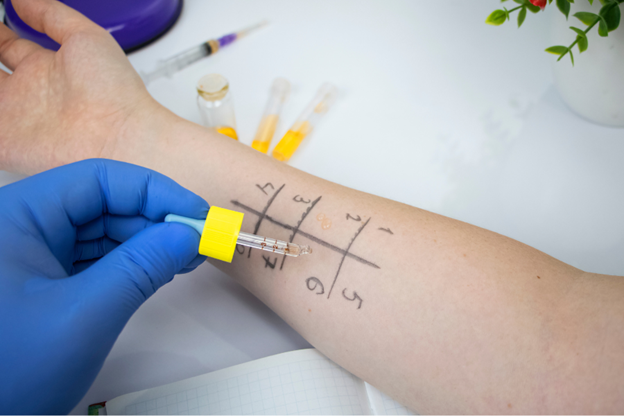Preparing for an allergy skin prick test may seem simple, but even small details can affect the accuracy of your results. If you’ve been struggling with sneezing, itching, or skin flare-ups, you know how important it is to get clear answers. This article outlines the five mistakes to avoid so your results reflect your true sensitivities. You’ll also learn how to prepare for allergy test appointments the right way, helping you approach your test with confidence and peace of mind.
1. Stop Antihistamines That Can Hide Real Reactions
Antihistamines help relieve allergy symptoms, but they can interfere with your results. These medications block histamine, the same chemical your doctor needs to measure during testing. If you take them before your appointment, your skin may not react, even when an allergen is present.
Most doctors recommend stopping antihistamines for three to seven days before testing. This includes Zyrtec, Claritin, and Benadryl, as well as certain sleep aids or cold medications. Always confirm with your healthcare provider before stopping any medication. Following this advice ensures you’ll get accurate results from skin prick test procedures and a clearer understanding of what truly affects your body.
2. Skip Lotions and Scents to Let Your Skin React Naturally
Applying lotion, perfume, or oil before testing can block allergens from reaching your skin. Some products may even irritate your skin and confuse the results.
One of the most effective allergy testing preparation tips is to arrive with clean, dry skin. Avoid applying any skincare or fragrance products to your forearms or back, where the test is usually performed, for at least 24 hours before your appointment. This simple step helps your skin respond clearly and naturally to the allergens applied.
3. Share Details About Rashes, Colds, or Recent Medication
Your immune system should be steady for accurate testing. If you’ve had a cold, rash, or infection recently, or if you’ve started a new medication, your results might not reflect your true condition.
Be honest with your doctor about any health changes, even if they seem minor. Let them know about new prescriptions, supplements, or symptoms you’ve experienced. This allows your provider to apply the most effective allergen sensitivity testing methods to ensure your results are reliable and relevant to your current state of health.
4. Watch What You Eat and Drink Before Testing
Certain foods and beverages can alter your body’s responses during testing. Spicy meals and caffeine can heighten skin sensitivity, while alcohol can increase blood flow and cause your skin to react differently.
Eat a light meal and stay hydrated before your appointment. Try to avoid caffeine and alcohol for about twelve hours beforehand. When your body is balanced, your skin reacts more consistently, and your results are easier to interpret.
5. Rest Well and Stay Calm for Reliable Results
Your body works best when you’re well rested and relaxed. Lack of sleep or high stress can affect your immune system and change how your skin reacts.
Get a full night’s rest before your test. Arrive early so you can settle in without feeling rushed. If you tend to feel anxious, take slow, steady breaths to help your body relax. A calm mind supports accurate results and makes the experience smoother from start to finish.
What to Expect During an Allergy Skin Test
Understanding what happens during the procedure can ease your worries. During your appointment, your clinician will apply small drops of allergens such as dust mites, pet dander, or pollen onto your forearm or back. Each allergen is gently pricked into your skin to trigger a natural reaction.
After about fifteen to twenty minutes, your doctor will observe your skin for any redness or small raised bumps. These indicate sensitivity to specific allergens. This process forms the foundation of skin allergy diagnosis and helps specialists identify which triggers are causing your symptoms.
Why Preparation Matters More Than You Think
Proper preparation helps you save time, money, and energy while ensuring that your treatment plan is accurate. It also gives your doctor the clearest information possible, leading to a more effective allergy management strategy.
Every allergy skin prick test is conducted with precision, care, and attention to comfort. The medical team uses modern tools and proven methods to deliver dependable results. With the right preparation, you can feel confident that your test will provide valuable insights into your health.
Taking time to prepare for your test makes a meaningful difference in your results. Avoid antihistamines, skip skin products, inform your doctor about any changes in your health, eat sensibly, and get enough rest. Each step helps your body respond naturally and ensures that your results are accurate.

